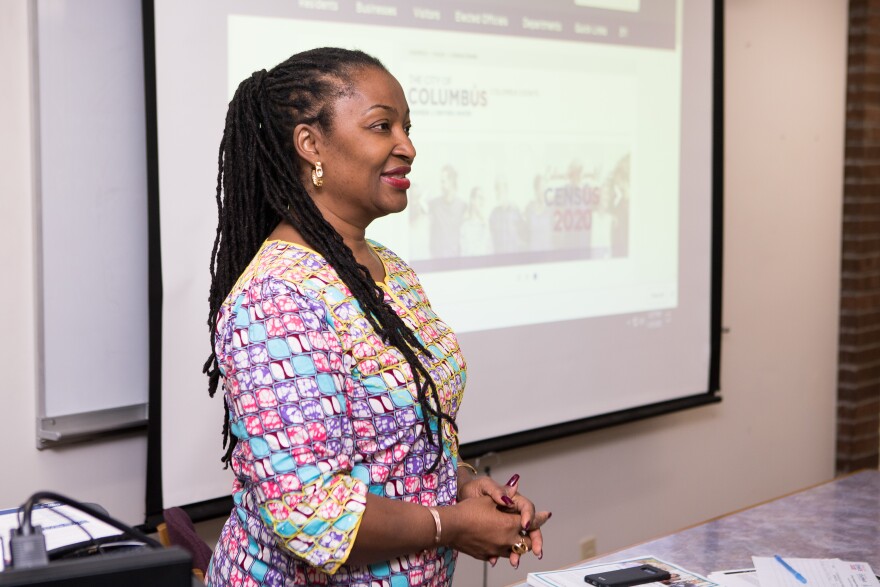Efforts are underway in Ohio for the 2020 Census, the U.S. government's once-a-decade effort to count every resident in the country. Mailers will begin showing up on doorsteps as early as next month, with a national Census Day planned for April 1.
At stake is an distributed by the federal government to fund everything from Medicaid and Medicare, school lunches, education, transportation and infrastructure. Ohio's representation in Congress, and local power in the state legislature, are also determined by this Census count.
Columbus wants its share. The area is growing quickly compared to other parts of the state – an increase fueled in large part by an influx of immigrants and refugees.
“Our most vulnerable residents, and the residents that are most likely to be missed in the census, are the ones that have the most on the line,” says Doug Murray.
Get The Count Out
The U.S. Census Bureau officially began its on January 21, while most households will begin receiving information through the mail in mid-March. In the months leading up, Columbus officials have been working behind the scenes to spread the word.
Murray leads Columbus Counts, a committee within the mayor's office coordinating efforts across Franklin County. They're taking a grassroots approach, tapping leaders from across the city to educate and rally their communities.
Murray says the city is paying extra attention to “hard-to-count” groups like LGBTQ residents, people experiencing homelessness, immigrants and refugees. Every one of them, young and old, must be included.

Rosaire Ifedi, a Nigerian and the founding chair of Ohio's , is spearheading city outreach to African immigrants.
“Obviously Africa is a huge continent, so the charge isn’t small,” Ifedi says.
Columbus has the second-largest population of Somali refugees in the nation. It also boasts large communities of Ghanian, Nigerian, Mauritanian, Senegalese, Congolese, Ugandan, Ethopian and other immigrants.
While some have lived in the country for decades, many are new arrivals and haven't encountered the census before. Language and reading skills add additional hurdles, as do cultural differences.
Ifedi says African immigrants in the U.S. tend to organize around country-based organizations and houses of worship. For the last year, her subcommittee has been speaking at mosques and churches, and tabling at cultural events around the city.
Ifedi’s encouraging people to with the federal Census Bureau, to act as a cultural bridge, and she's recruiting volunteers to help with translation. Recently, the city handed out thousands of dollars in grants to local groups like the Ghana Council, Elevate Northland and the Somali Community Association of Ohio, who are launching initiatives of their own.
This is also the first census that will primarily take place online, although respondents can still participate through mail, over the phone or in person with Census workers. Columbus is working to arrange census stations in libraries and community centers where people can get help filling out the forms.
Fighting Fears
In January, Ifedi invited community advocates to gather at a branch campus of Ashland University in Columbus’ Northland neighborhood, where she works. Before attendees could talk strategy, they had to tackle a more pressing concern: How to make sure people don’t fear the census.
“There’s a big fear in the community of undocumented Americans. When it comes to census people, they fear to let ourselves be known to the community,” said Donald Ikaptain, a Nigerian immigrant. “How are we going to make them feel like they are really protective instead of having fear that they will be deported?”

Ikaptain says Nigerian immigrants like him worry about being exposed to the government. Many believe that if they give out their name and address, they'll come under the scrutiny of immigration enforcement – even if they're here legally.
Houleye Thiam understands his concern. Her home country of Mauritania, in West Africa, has conducted a decades-long campaign of ethnic cleansing against black residents. Her own father has been arrested twice for his activism.
“When it comes to fear, we also have to acknowledge a lot of places this fear is coming from,” Thiam says. “It could be the fear of that citizenship question that was struck down, but it’s also the fear of how we have watched our own governments use data in our countries.”
Thousands of Mauritanians settled in Ohio, but weren't granted asylum. After years of living here, many have been for deportation by the Trump administration.
Worries about the government were only magnified by the administration’s on the 2020 census. Advocates argued that adding a citizenship question would deter both documented and undocumented immigrants from participating – and that was the very intention of the question.
Last year, the U.S. Supreme Court the citizenship question from being included. But the lingering effects of that battle remain.
“It did a lot of damage,” Murray admits.
A new found that a majority of American adults incorrectly believe the 2020 census includes a citizenship question. And only 53% of respondents know that the census is not used to determine whether someone is in the country legally.
Speaking to African community leaders, Ifedi emphasizes not only the importance of the headcount, but its safety. The questionnaire is confidential, so the government won't – and legally can't – share personal data until 72 years after it's collected.
“With all the myths and fears and misinformation out there, we needed to put those to rest,” Ifedi says. “That this wasn’t a way to get you out of here, but the way to help you.”
Despite the challenges, Ifedi feels optimistic. She knows African immigrants are a powerful force in Ohio, and finally, she'll have the numbers to prove it.
“That part of it energizes me to say, this is still the best of who we are as Americans,” Ifedi says.
This story has been edited to reflect updated Census information.





